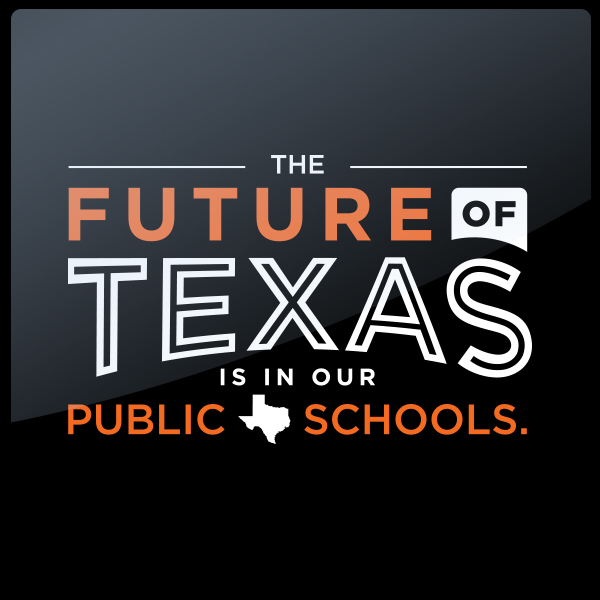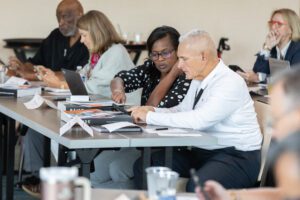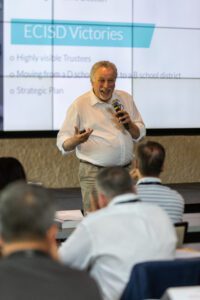
categories
Empowering Texas school boards through public education advocacy training

September 08, 2023
Raise Your Hand Texas held its inaugural Trustee Advocates Program Summit earlier this month, welcoming more than 20 school districts that collectively represented more than 550,000 Texas students across the state.
Summit speakers included Katy ISD Superintendent Dr. Ken Gregorski, Tornillo ISD Board President Marlene Bullard, Ector County ISD Board President Chris Stanley, Gregory-Portland ISD Superintendent Dr. Michelle Cavazos and Board President Tim Flinn, and Alpine ISD Superintendent Dr. Michelle Rinehart. The summit’s legislator panel included Rep. Steve Allison (HD 121), Rep. DeWayne Burns (HD 58), Rep. Ray Lopez (HD 125), and Rep. Gina Hinojosa (HD 49), and the advocacy panel featured RootEd Co-Founder Genevieve Sugalski, advocate Faith Colson, and Katy ISD trustee Lance Redmon. Members of Raise Your Hand Texas’ statewide advocacy team, Missy Bender, Dr. Libby Cohen, Will Holleman, Giovanni Escobedo, Deann Lee, Sophie Torres, and Larry John Porras, also led sessions. A special thanks goes out to our presenting sponsor VLK Architects, as well as Thomas & Horton, and BOK Financial Services who supported the Summit as partner sponsors.

Superintendents and school board trustees each walked in the door with a different level of advocacy competency, as well as unique challenges for their school districts and communities. The goal of the three day Summit was to equip school districts with techniques and tips to engage their constituencies and inform their legislators about their most pressing local issues and partner with the district to find valuable solutions.
Connect the community to the Capitol
Dr. Libby Cohen said that effective advocacy happens with your community. Participants shared that, many times, thoughts and fears around the political process can contribute to their hesitancy to become involved – or a complete lack of involvement in legislative engagement.
“Politics is essential,” Cohen said. “Whether we like it or not, politics is the process by which we address common challenges with common resources. It is a type of authority, and choosing to get involved in politics is good, and it is a way to do right by your students and your community. Advocacy is about speaking up, stating what you need, and making a case to the people in authority positions.”
Cohen said a part of advocacy is confrontation, especially when the people in power do not agree with your stance. “It can be a really uncomfortable thing, and it can be exhausting, but you don’t need to do it alone,” Cohen continued. “Even the best leaders, if they try to go it alone, will be really limited in the scope of the impact they can create. You should be looking to build your advocacy team.”
Katy ISD Superintendent Ken Gregorski shared how his district created advocates by learning, listening, educating, and activating their local community. “If you don’t have a seat at the table, then you will be on the menu,” Gregorski said. “And right now, public education is on the menu.”

Members of the legislative panel, Texas Representatives Steve Allison, DeWayne Burns, Ray Lopez, and Gina Hinojosa all previously served as trustees on the Alamo Heights, Cleburne, Northside, and Austin school boards, and together discussed the power of advocacy and best practices for effective advocacy to influence public education policy.
Organized communication with legislators effectively influences public education policy
“Storytelling is a key component of advocacy,” Rep. Hinojosa said. “It communicates how decisions we make at the state impact our communities in a way that facts and figures can’t.” Rep. Allison expanded on this with a personal story about a tragic incident in Alamo Heights regarding bullying, where the driving force behind action and change was stories from family and community advocates.
Advocacy is an ongoing process that relies on organized communication and relationship building. All the representatives emphasized the importance of year-round advocating, including times outside of a legislative session. “It’s always a good time to be advocating,” Rep. Lopez said. “One good method to trigger your advocacy is to figure out when committees that deal with educational issues are meeting, find out who is a part of them, and talk to them. Don’t limit yourself to just the public education committee.”
While party lines may sway legislators’ decisions, the panel agreed students are not red or blue, they are the future of our country and worth fighting for. “Start with what’s best for the kids, and if your legislature is worth anything, that should mean something,” Rep. Burns said. “Tell stories, have the information, and there is always hope and a chance.”
Community advocates can supercharge your school district’s advocacy
Faith Colson, a public education advocate from Ponder, Texas, shared her experience, successfully advocating for the prevention of child sexual abuse in Illinois, drawing on a school safety issue that happened when she was in high school. In Texas, she advocated for regulating digital usage in Texas public schools, which resulted in HB 3489 (87R).
Colson said that finding a lawmaker willing to listen helped her achieve her advocacy goal. “Good legislation takes time, and good policy requires listening,” she said.
Developing legislative priorities and engaging the community in that effort
As Regional Advocacy Directors for Raise Your Hand, Deann Lee and Sophie Torres emphasized that finding and understanding your issues is essential to advocacy. They recommend starting by asking questions such as “What are the problems?” and “What needs to be fixed?” to establish legislative priorities. Then, consider the stakeholders and find research and personal stories to support your mission.
“Chances are, the legislators know far less about your issue than you do,” Torres said. “Unless you can clearly identify the problem, why it matters and offer possible solutions, they are unlikely to consider the issue.”

Educating your constituency to activate them on the school district’s behalf
Chris Stanley, Ector County ISD Board President, spoke about creating a bridge between parents, board members, and educators. He listed effective communication, addressing misinformation, and demonstrating transparency as a few ways board members can help meet the needs of their constituents, from parents and teachers to district employees.
On the last day of the Summit, some attendees reflected on the experience, sharing what they learned and what they will take away from it moving forward.
“I’m extremely proud to be here”
“It has been a very positive experience, especially for our district,” said Brian Coufal, Kingsville ISD Board President. Coufal said the Summit allowed him and his board members to be “teammates and, collectively, better advocates in the State of Texas.” He continued, “This experience has pointed out where we are in the process by collaborating with other districts who are at the same point as us or further ahead. We have learned about things other districts are doing that we can look to implement in ours.”
“I’m extremely proud to be here,” said Larry Jagours, McKinney ISD Board Trustee. “I’m learning so much I can take back and share with my colleagues on the board and our school district administration. I’m learning how advocacy works across a broader spectrum and how to present to the legislation about our district issues in a more positive way that isn’t threatening to them.”
“I’m hopeful this will be an annual event for Raise Your Hand Texas. It is really good to be part of the first one,” Jagours said.
Applications are now open for the next cohort of Trustee Advocates Program. You can apply now!



